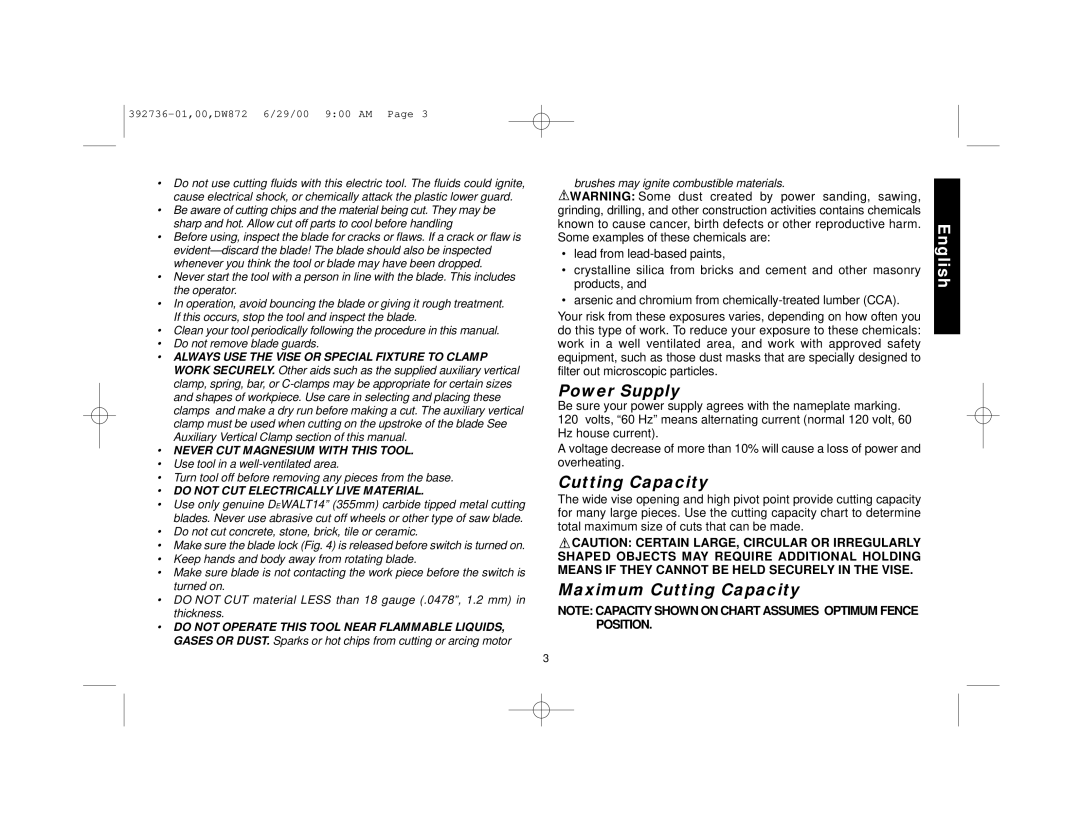
392736-01,00,DW872 6/29/00 9:00 AM Page 3
•Do not use cutting fluids with this electric tool. The fluids could ignite, cause electrical shock, or chemically attack the plastic lower guard.
•Be aware of cutting chips and the material being cut. They may be sharp and hot. Allow cut off parts to cool before handling
•Before using, inspect the blade for cracks or flaws. If a crack or flaw is
•Never start the tool with a person in line with the blade. This includes the operator.
•In operation, avoid bouncing the blade or giving it rough treatment. If this occurs, stop the tool and inspect the blade.
•Clean your tool periodically following the procedure in this manual.
•Do not remove blade guards.
•ALWAYS USE THE VISE OR SPECIAL FIXTURE TO CLAMP WORK SECURELY. Other aids such as the supplied auxiliary vertical clamp, spring, bar, or
•NEVER CUT MAGNESIUM WITH THIS TOOL.
•Use tool in a
•Turn tool off before removing any pieces from the base.
•DO NOT CUT ELECTRICALLY LIVE MATERIAL.
•Use only genuine DEWALT14” (355mm) carbide tipped metal cutting blades. Never use abrasive cut off wheels or other type of saw blade.
•Do not cut concrete, stone, brick, tile or ceramic.
•Make sure the blade lock (Fig. 4) is released before switch is turned on.
•Keep hands and body away from rotating blade.
•Make sure blade is not contacting the work piece before the switch is turned on.
•DO NOT CUT material LESS than 18 gauge (.0478”, 1.2 mm) in thickness.
•DO NOT OPERATE THIS TOOL NEAR FLAMMABLE LIQUIDS, GASES OR DUST. Sparks or hot chips from cutting or arcing motor
brushes may ignite combustible materials.
![]() WARNING: Some dust created by power sanding, sawing, grinding, drilling, and other construction activities contains chemicals known to cause cancer, birth defects or other reproductive harm. Some examples of these chemicals are:
WARNING: Some dust created by power sanding, sawing, grinding, drilling, and other construction activities contains chemicals known to cause cancer, birth defects or other reproductive harm. Some examples of these chemicals are:
•lead from
•crystalline silica from bricks and cement and other masonry products, and
•arsenic and chromium from
Your risk from these exposures varies, depending on how often you do this type of work. To reduce your exposure to these chemicals: work in a well ventilated area, and work with approved safety equipment, such as those dust masks that are specially designed to filter out microscopic particles.
Power Supply
Be sure your power supply agrees with the nameplate marking.
120volts, “60 Hz” means alternating current (normal 120 volt, 60 Hz house current).
A voltage decrease of more than 10% will cause a loss of power and overheating.
Cutting Capacity
The wide vise opening and high pivot point provide cutting capacity for many large pieces. Use the cutting capacity chart to determine total maximum size of cuts that can be made.
![]() CAUTION: CERTAIN LARGE, CIRCULAR OR IRREGULARLY SHAPED OBJECTS MAY REQUIRE ADDITIONAL HOLDING MEANS IF THEY CANNOT BE HELD SECURELY IN THE VISE.
CAUTION: CERTAIN LARGE, CIRCULAR OR IRREGULARLY SHAPED OBJECTS MAY REQUIRE ADDITIONAL HOLDING MEANS IF THEY CANNOT BE HELD SECURELY IN THE VISE.
Maximum Cutting Capacity
NOTE: CAPACITY SHOWN ON CHART ASSUMES OPTIMUM FENCE POSITION.
3
English
